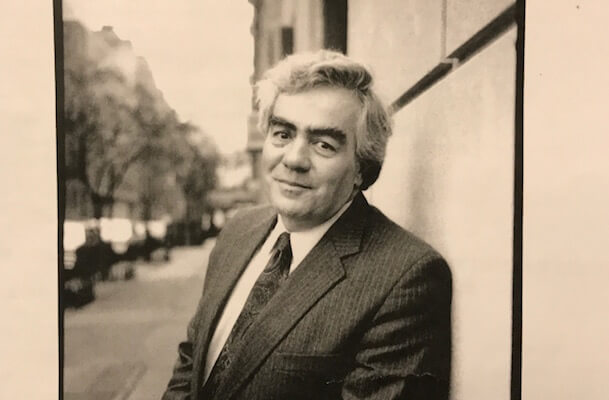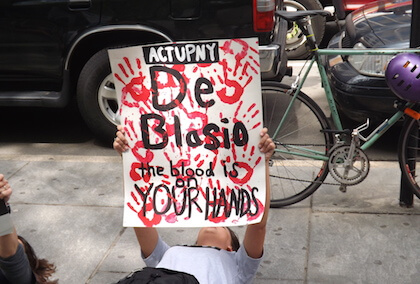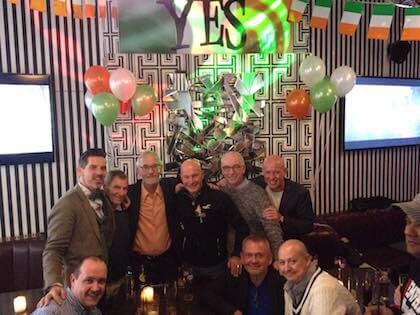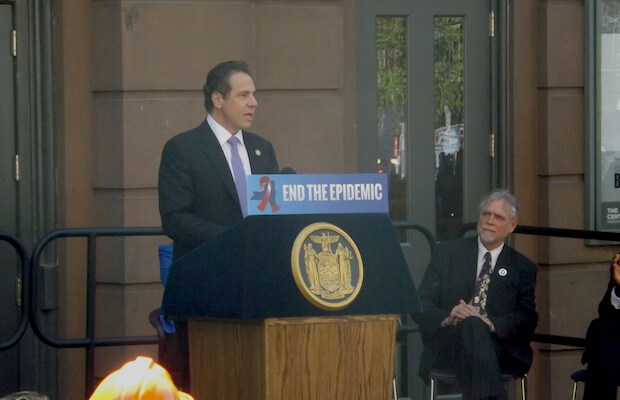Jimmy Breslin’s funeral program.
Jimmy Breslin, who died March 19 at 88, was the greatest newspaper columnist in New York at a time when as top columnist for the Daily News, he could command half a million dollars a year and the tabloids he wrote for had immense power.
Those days are over for newspapers, but in his day Breslin could make news and provoke outrage with his brilliant, spare writing and his feel for the little guy.
Breslin was gruff and abrupt, but also hilarious and charming. He was a tireless tribune of the powerless. He wrote peerlessly about bookies and gangsters and political charlatans. But he won his Pulitzer Prize for Commentary in 1986 for his columns on the unfolding AIDS crisis, humanizing those sick from the virus for which there was then no effective treatment.
Gruff, abrupt, charming, hilarious, tireless tabloid veteran won Pulitzer for AIDS columns
Allen Roskoff, a veteran gay activist and a longtime friend of Breslin and his wife of 34 years, former City Councilmember Ronnie Eldridge, took Breslin to Uncle Charlie’s Downtown, a gay bar on Greenwich Avenue, and Champs in the Flatiron District to meet people with AIDS for the stories. Roskoff introduced him to David Camacho, a gay political activist from the Village with AIDS and his husband, James Duff, who went on to be a big TV producer (“The Closer”).
Camacho was a young, handsome, bright guy who had the guts to be out about his disease and to show his disfigured face to the world at a time when some PWA’s were jumping off buildings to avoid the shame. Here is how Breslin captured David’s life: “He had two good weeks in July and then the fever returned and he was back in the hospital for half of last August. He got out again and returned to Eighth Street. The date this time doesn’t count. By now, he measured nothing around him. Week, month, day, night, summer heat, fall chill, the color of the sky, the sound of the street, clothes, music, lights, wealth dwindled in meaning.”
Another of the AIDS columns was about a young man from Georgia. In it, Breslin trenchantly covered how gay people from small towns get out and come to New York –– and how many of them ended up coming out to their fundamentalist families at the same time they disclosed their diagnoses. He quoted the man in this way: “There was never any one time when I said anything to my family or they said anything to me. I lived without words.”
Breslin also hit on the heartlessness of insurance companies, especially when it came to AIDS in those days.
“He had a rough exterior but a heart of gold,” Roskoff said.
Gay civil libertarian Bill Dobbs, also close to Breslin and Eldridge, said, “Jimmy was an amazing fighter for social justice. His death is a huge loss, but his work continues to inspire.”
When Breslin ran for City Council president in 1969 with Norman Mailer running for mayor, their campaign slogan was “Vote the Rascals In.” They also pushed for the city to be the 51st state. They lost.
Breslin said, “Rage is the only quality which has kept me, or anybody I have ever studied, writing columns for newspapers.”
The abuse scandals in his Catholic Church angered him so much that he wrote a 2004 book, “The Church that Forgot Christ.”
Breslin was asked a few years ago, “What’s wrong with journalism today?” And he said, “They don’t go out! Television would be your answer. They’re all on television giving the news. As you listen to them talk, you know they haven’t left the office.”
While most of the New York press treated Donald Trump as some kind of lovable rogue or admirable businessman, Breslin warned us about him in 1989 when Trump took out a full-page ad calling for the death penalty for the Central Park Five, young black men wrongfully convicted of rape and exonerated decades later.
“Outside the courthouse,” Breslin wrote in Newsday, “beware always of the loudmouth taking advantage of the situation and appealing to a crowd’s meanest nature.”






































